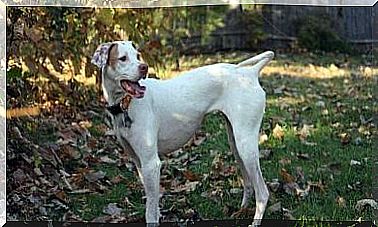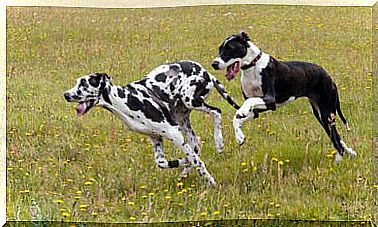Are Carbohydrates Bad For Dogs?

There has been a boom in high protein canine nutrition in recent years. The reason is the belief that carbohydrates are bad for dogs based on some scientific conclusions.
Many owners, due to advertising campaigns aimed at disinformation in which marketing plays the main role, believe that dogs do not need carbohydrates.
This claim would not be entirely false, as a grain-free canine diet has been shown to be quite effective. However, the total exclusion of this type of nutrient would only be advisable in dogs allergic to grains.
Another possible reason to justify that carbohydrates are bad for dogs is their alleged inability to digest them. This idea, with the exception of cases of food intolerance, is physiologically wrong.
Although dogs do not possess salivary amylase, an enzyme necessary for the breakdown of complex carbohydrates, they do have pancreatic amylase. The presence of the latter guarantees adequate digestibility of starches. Let’s try to understand together if carbohydrates are bad for dogs.
When are carbohydrates bad for dogs?
The problem with foods rich in carbohydrates does not lie in their presence, but rather in being a substitute for quality proteins. The main reason is the lower cost of production at the expense of the animal’s nutritional health and occurs mainly in kibble diets.
Proteins, especially those from meat, are a direct source of all essential amino acids. In addition, they provide high percentages of vitamins A, E, B and D, recommended in the daily intake, and small doses of other essential vitamins such as C.

It has been shown that a high carbohydrate intake can contribute to the body’s vitamin depletion. In fact, Columbia University researcher Theodore Van Itallie said vitamin B and C levels drop after excessive grain intake. This could also be related to an excessive intake of fiber, which reduces the absorption of vitamins and minerals.
On the other hand, it is worth bearing in mind that this also applies to allergies. Corn and wheat are two of the five main ingredients that cause intestinal sensitivity. At the same time, some breeds such as the Irish Setter have been seen to have a greater predisposition to celiac disease.
Benefits of carbohydrates when taken in adequate doses
If the dog is allergic to some type of grain, claiming that carbohydrates are bad for dogs and acting accordingly can even harm the animal. Carbohydrates, provided in a balanced way, offer a number of benefits, including:
- Whole grains contain many vitamins, especially the B group and minerals.
- The fibers contained in whole grains contribute to the maintenance of the intestinal flora, essential for the elimination of toxins and for the facilitation of the digestive process.
- Soluble fiber, like that found in oats, regulates glucose and cholesterol levels.
- In addition to fat, carbohydrates are one of the most important energy sources.

Therefore, the best option when feeding the animal is to choose foods that guarantee an adequate nutritional balance. The protein content must exceed the lipid content, which can be contained in meat, dairy products, eggs, fish or soy. As for cereals, unless specific recommendations by the veterinarian, whole ones must prevail over refined ones.
Softening the food, opting for moist or homemade food and excluding certain ingredients are decisions that must be made based on the recommendations of the specialist and the physiological response of the animal. However, in the case of good intestinal health, the nutritional balance usually guarantees the well-being of the dog.









